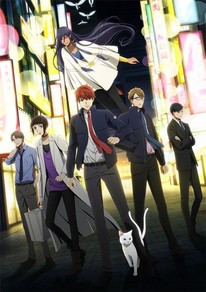Review
by Theron Martin,Midnight Occult Civil Servants
Episodes 1-12 streaming
| Synopsis: |  |
||
Fledgling civil servant Miyako Arata is the newest employee at the Shinjuku Ward office of the Nocturnal Community Relations Division, a bureau that he knows nothing about before showing up for work his first night. He quickly learns that the NCRD deals with Anothers (the general name for supernatural entities), resolving problematic interactions between these otherworldly beings and humans. He also quickly discovers that he's the only one who can actually understand Anothers, and that he inherited this ability called Ears of Sand because he is a descendant of the famed onmyoji Abe no Seimei. Using this ability, Miyako unwittingly becomes a diplomat between Anothers and humans, which greatly helps resolve the bureau's cases and attracts the attention of a god who once regarded his ancestor as a close friend. However, not everyone he works with sees his ability as a positive or trusts his talents. |
|||
| Review: | |||
Sometimes the polls that determine what titles will be covered for streaming reviews on ANN miss a title worthy of greater attention, and Midnight Occult Civil Servants is a good example. Though the series has its faults, it winds up being a surprisingly engrossing look at the importance of establishing communication in diplomatic relations. The premise is deceptively simple: a newcomer upends a government bureaucracy by being able to understand what couldn't be understood before, unwittingly forcing a paradigm shift on how the division conducts its business. Before Miyako came along, the NCRD carried out cases with Anothers based only on educated guesses about what these unfathomable beings actually wanted. That still puts them ahead of the regular public, who cannot even perceive Anothers, much less communicate with them. Because of that, the NCRD naturally holds a distrust of Anothers, and that doesn't instantly go away once an actual translator joining their ranks. While some members of both Miyako's office and the NCRD in general see him as an invaluable resource, others are skeptical about whether or not communications with Anothers can be trusted, since they completely lack human priorities. That skepticism is by no means a pervasive element of the story, but it's never entirely set aside, and it comes into play considerably during the penultimate case. Suggestions of racism are undeniably present in the dynamic between Anothers and humans, but at the same time, Anothers can undeniably cause harm to humans, intentionally or otherwise. Miyako also must learn the hard way that understanding the language of the Anothers does not always mean that he can understand their nature, and it actually makes him more vulnerable to their capacity to prey on his naivete. The plot of MOCS involves a series of cases that typically take one or two episodes to resolve. There is some carryover between cases, especially in the way recurring characters join the cast, but the continuity is usually not tight. The entertainment quality of the individual stories does vary; the first is just a retread of a “Romeo and Juliet” scenario involving different types of supernatural creatures, but one of the best involves an immortal creature's Frankensteinian efforts to bring a deceased love back to life – whether she wants to be brought back in a different body or not – and how that is connected both to long-standing Missing Persons cases and the debilities they suffer when they reappear, sometimes decades later. Some of the content is also topical, with the stadium construction for the 2020 Olympics figuring prominently into the last story arc. The source material's nature as a shojo manga is subtler than usual but still pervasive, giving the overall presentation a distinct flavor. All of the regular cast members are handsome (or in one case girlishly pretty) young men cut from bishonen molds; hardly any female characters get more than cameos outside of the case where they are featured. The most frequently-appearing Another, an Aztec god who befriended Miyako's ancestor and is now obsessed with him, stands out as a particularly attractive design. The way he acts toward Miyako just drips with BL implications, even though that all remains subtextual. Character design aesthetics follow typical shojo trends, but the anime is not so thoroughly-steeped in shojo flavor that those normally averse to the genre need avoid it. The technical merits for the series are not the strongest overall, though some individual scenes offer exceptions. The visuals are at their best in various scenes of beautiful gardens and some creative Another designs, and the extensive detail work on the locales in Shinjuku and the Olympic stadium is impressive. On the downside, some facial expression work looks off, and the animation goes off-model fairly often. The series is more consistent in its solid but mostly unremarkable musical score, though opener “dis-communicate,” sung by Miyako's seiyuu Jun Fukuyama, is a stand-out number. In the end, Midnight Occult Civil Servants follows through on its standard genre premise without many surprises. However, it executes its concept well enough with just enough depth and thought to make it worth a watch for those interested. |
| Grade: | |||
|
Overall (sub) : B
Story : B
Animation : B-
Art : B-
Music : B
+ More depth than expected, good opening theme, somewhat different take on working with the supernatural |
|||
| discuss this in the forum (2 posts) | | |||
| Production Info: | ||
|
Full encyclopedia details about |
||